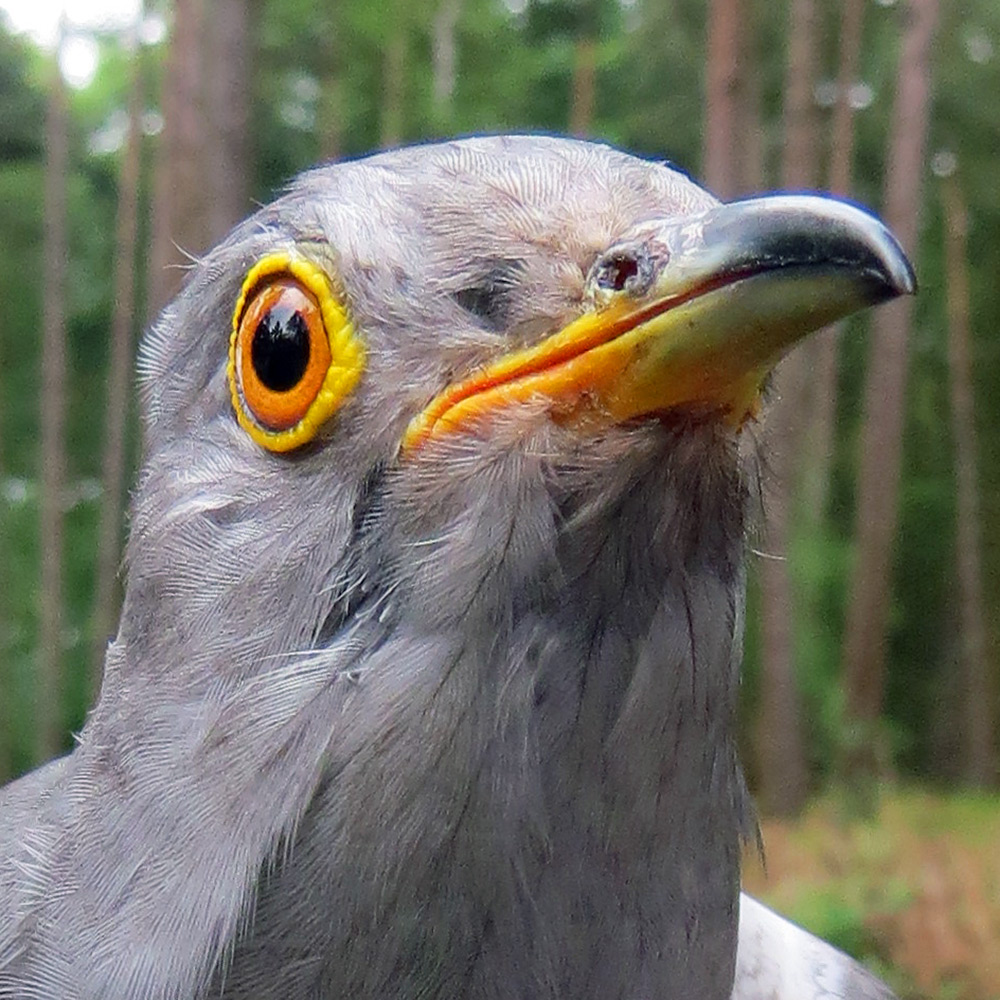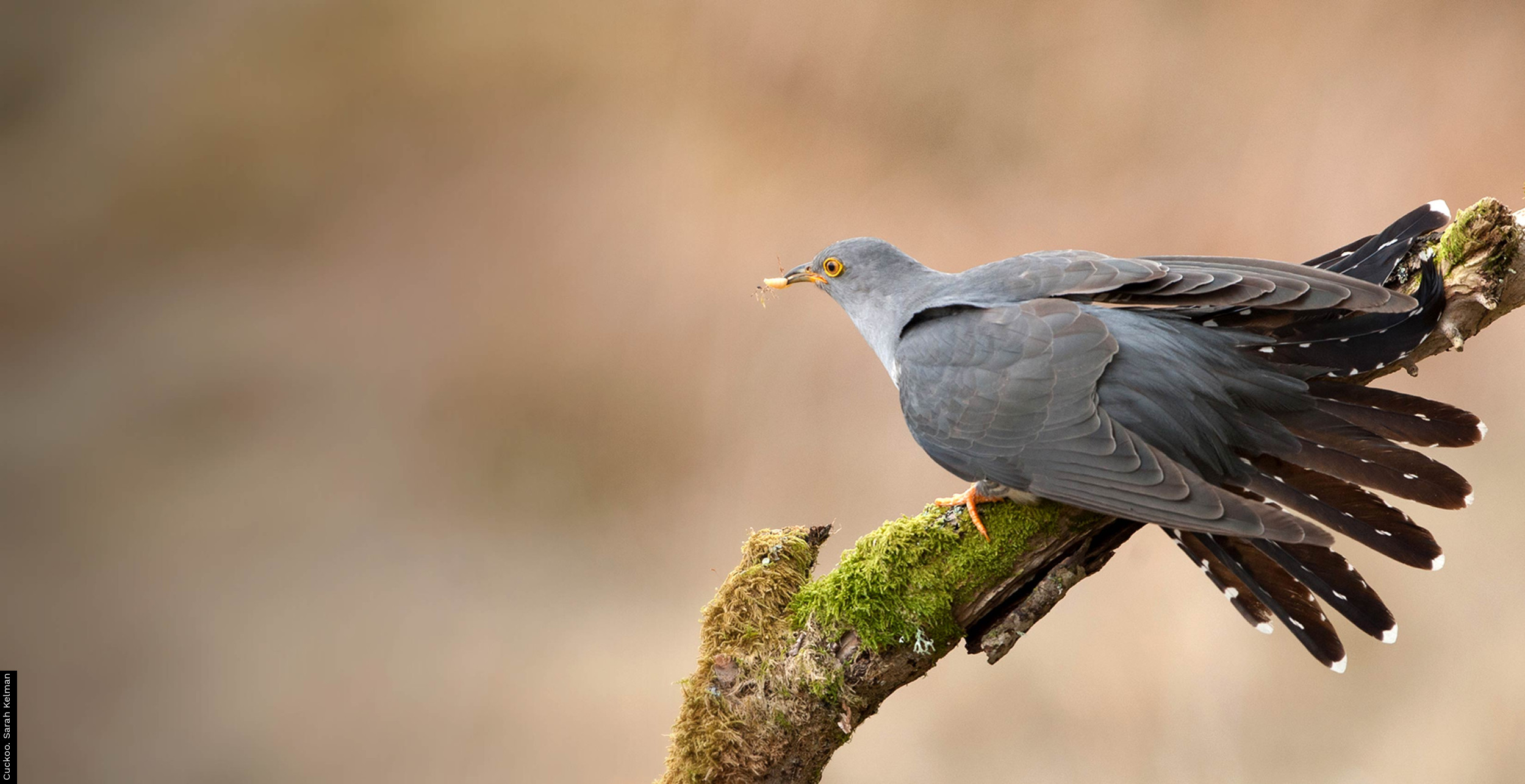Peter
Peter has been named by a BTO Member after Peter Conder. Whilst in a POW camp during World War II, Peter studied the Redstarts close to the camp and began one of the first long-term studies of an Afro-palearctic migrant.

- Status:
- Inactive
- Tagged:
- Tuesday, May 27, 2014 - 01:00
- Tagging Location:
- Bolderwood, New Forest, Hampshire
- Sex:
- Male
- Age when found:
- Over one year
- Satellite Tag No.:
- 134959
- Wing Length (mm):
- 224
Peter's journey from 27 May 2014 to 16 October 2014
Peter's movements
29 May 2015 - Further transmissions unlikely to be received
It looks likely that BB, Peter, Skinner, Waller and Whortle have failed to complete their migration this year, or their tags are no longer transmitting, and so we will be moving all of them to the inactive section of the website.
24 Feb 2015 - Cuckoos missing off the map
From time to time we ‘lose’ one or two of our Cuckoos only for them to reappear several days, or even weeks, later. We are never entirely sure why this might be at the individual level but during the course of the project we have noticed similarities between some of the ‘lost’ birds.
We have lost some of our birds just prior to them making a large movement and we think that this might be because they move into denser vegetation in order to feed up before embarking on a long flight. Moving into denser vegetation may mean that the solar panel that recharges the battery for the tag is in shade for periods of time and the battery receives a poorer charge, which in turn results in poorer performance from the satellite tag.
Once the birds have put on enough weight to begin their journey they move into the open and the tag begins charging again and the birds ‘reappear’. We also see the same thing happen, although to a lesser extent, when birds complete a long movement and presumably move into denser vegetation to rest and feed up
04 Feb 2015 - Lack of signals
Several of our Cuckoo tags have not sent transmissions for over 10 days; BB, Hennah, Peter, Skinner and Waller.
This means they are not currently shown on the main map by default, although can be switched on using the tick boxes under their photos. It's not uncommon for Cuckoos to disappear for up to several months during mid-winter as tag charging conditions in the forest are poor so we won't really know their fate unless we receive further transmissions. If they fail to move northwards when expected then either the Cuckoo may have died or the tag may failed or degraded. Our greatest concerns are still for Peter and Waller who were in the same area when signals were last received, all the way back in October.
16 Dec 2014 - No recent signals from Peter and Waller
We are concerned about whether we will receive further transmissions from Peter and Waller. They were in the same area and just 5km apart from each other, close to the Congo river in Democratic Republic of Congo, when signals were last received. Looking at the map, they seem to be in an area of unbroken canopy so the solar-powered tags may not be able to charge as they are not receiving light. The worry when batteries cannot charge over several months is that they may start to degrade and are not then able to switch on again when they do receive light. We will have to wait and see whether we receive further signals from the tags in future.
30 Sep 2014 - Early arrival of Cuckoos in the rainforest
Six of the tracked cuckoos (Peter, Dudley, Emsworthy, David, Livingstone and Stanley) are already within the Congo rainforest block. The first of these to arrive was Stanley on 16 September, the earliest of the tracked cuckoos ever to arrive there by 12 days! He was followed by Emsworthy on 19 and Livingstone and Dudley on 23. Previous to this year, the earliest Cuckoo had been Chris, who arrived there on 25 September in 2012.
Since then, David arrived on 24 and Peter on 28 September 2014. David was five and four days earlier than in 2012 and 2013 respectively whilst Livingstone was 13 days earlier than last year. It is very interesting to note that all four of the cuckoos who beat the previous earliest arrival date came from northern Cameroon and the adjacent part of Chad, a region that has received over 50mm less rainfall than usual over the past month and more than 100mm less over the past three months.
Sponsor a Cuckoo and support the project
“This is my first year following the Cuckoo’s journey and I would like to thank you for the happiness and pleasure it has given me reading your updates. I look forward to the next journeys. Amazing!”
Sponsor your chosen Cuckoo with a monthly Direct Debit or a one-off donation, and receive exclusive updates and insight into their migration.
Become a Cuckoo sponsor todayInformation on this page is for illustrative purposes only and should not be reproduced without permission
© British Trust for Ornithology.



Share this page